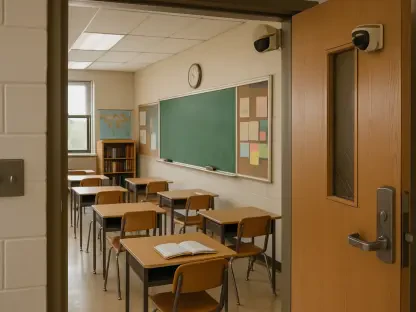In a significant step toward addressing the escalating mental health crisis among students, the U.S. Department of Education has reinstated a substantial $270 million in funding for school mental health programs, with the announcement made on September 29 of this year. This decision revives two critical initiatives previously discontinued under the Trump administration: the School-Based Mental Health Services Grant Program and the Mental Health Service Professional Demonstration Grant Program. As schools across the nation grapple with rising emotional and psychological challenges among students, this funding aims to directly combat the severe shortage of school psychologists, ensuring better access to support services. The move has sparked both optimism for improved student well-being and debate over its scope and limitations. This development signals a renewed federal commitment to mental health in education, yet it also raises questions about how effectively these funds will meet the diverse needs within school communities.
A Troubled History of Funding Cuts and Revival
The journey of these mental health grants has been fraught with disruption, reflecting broader tensions in education policy. Initially approved by Congress for fiscal years prior to this year, the programs were abruptly halted in April due to a perceived misalignment with the priorities of the Trump administration. This cancellation triggered widespread frustration among educators and mental health advocates, ultimately leading to a lawsuit filed by 16 states, which remains unresolved. The discontinuation not only interrupted existing services but also discouraged many potential professionals from pursuing careers in school psychology, deepening an already critical shortage. Now, with the reinstatement of $270 million, split as $180 million for one program and $90 million for the other, the Department of Education is reopening applications to fund dozens of grants aimed at rebuilding mental health staffing in schools. This reversal is a response to intense advocacy, yet it arrives with lingering uncertainty about long-term stability.
While the funding revival marks a pivotal shift, it also underscores the fragility of such initiatives in the face of shifting political landscapes. The allocated funds are expected to support between 25-35 grants for the School-Based Mental Health Services Grant Program, averaging $1.5 million each, and 18-24 grants for the Mental Health Service Professional Demonstration Grant Program, averaging $1 million each. This structured investment seeks to enhance local and state capacity for mental health support. However, the earlier disruption has left a lasting impact, with many schools still struggling to recover from the loss of resources and personnel. The reinstatement, while a step forward, must contend with rebuilding trust among educators and ensuring that the application process is accessible and equitable. As schools prepare to apply, the focus remains on whether this funding can truly address the gaps left by years of inconsistency and policy changes.
Addressing a Critical Shortage in School Mental Health
The urgency for mental health support in schools has reached unprecedented levels, driven by increasing student challenges in recent years. According to data from the 2023-24 school year, the ratio of school psychologists to students stands at a concerning one per 1,065, far below the National Association of School Psychologists (NASP) recommendation of one per 500. This disparity means countless students lack access to essential emotional and psychological care, particularly as post-pandemic stressors continue to affect learning environments. The reinstated grants are specifically designed to tackle this shortage by increasing the number of credentialed school psychologists available to support students. By focusing on capacity building, the programs aim to create a more robust framework for addressing mental health directly within school settings, where students spend much of their formative time.
Beyond the numbers, the shortage of mental health professionals has tangible effects on student outcomes, from academic performance to social development. School psychologists play a vital role in identifying and addressing issues such as anxiety, depression, and behavioral challenges, often serving as a first line of intervention. The funding revival offers hope that more students will benefit from early support, potentially reducing long-term negative impacts on their education and well-being. However, the scale of the crisis demands swift and effective implementation of these grants to ensure that schools in underserved areas, where ratios are often even worse, receive adequate resources. The success of this initiative will largely depend on how quickly and equitably the funds translate into on-the-ground support, bridging the gap between current realities and recommended standards for student care.
Stakeholder Perspectives on the Funding Return
The reinstatement of these grants has elicited a range of reactions from education and mental health advocates, highlighting both promise and concern. Representatives from NASP, such as Kelly Vaillancourt Strobach, have emphasized the critical role of school psychologists in fostering student well-being through collaboration with families, teachers, and other staff. This funding is seen as a lifeline for creating supportive school environments where students can thrive emotionally and academically. The positive sentiment reflects a broader acknowledgment that mental health is integral to education, and targeted investments can yield significant improvements in how schools address student needs. For many, this development represents a long-overdue recognition of the importance of specialized professionals in navigating complex emotional challenges.
Despite the enthusiasm, there is notable apprehension about whether the funding goes far enough in scope. While the focus on school psychologists addresses a specific and pressing need, it overlooks other vital mental health professionals such as counselors and social workers, who bring complementary skills to student support systems. Critics argue that a singular emphasis may not fully meet the diverse demands of student populations, particularly in schools with multifaceted challenges. This perspective underscores a desire for a more balanced approach that values the contributions of all mental health roles within educational settings. As the grants roll out, ongoing dialogue among stakeholders will likely shape how future funding priorities are defined, with many hoping for a broader inclusion of professionals to ensure comprehensive care.
Debating the Narrow Focus and New Constraints
A significant point of contention surrounding the revived grants is their exclusive focus on school psychologists, which has sparked debate about the completeness of the approach. Myrna Mandlawitz, a policy consultant for the Council of Administrators of Special Education, has highlighted that school counselors and social workers offer unique expertise essential for a holistic support system. Excluding these roles from the funding scope risks creating gaps in service delivery, as different professionals often address distinct aspects of student mental health. While acknowledging the reinstatement as a positive move, Mandlawitz describes it as “better than nothing,” reflecting a broader concern that the current framework might hinder schools’ ability to fill vacant positions across all necessary roles. This critique points to the need for a more integrated strategy that recognizes the interconnected contributions of various mental health experts.
Adding further complexity, the Department of Education has introduced new guidelines for future grant allocations, prohibiting the use of funds for programs associated with certain ideological or political themes. Although specifics remain limited, these restrictions suggest potential constraints on how schools can tailor mental health initiatives to meet diverse student needs. Such conditions have raised concerns among advocates who fear that the flexibility to address critical issues like equity or cultural sensitivity in mental health care could be compromised. As schools begin to navigate these guidelines, the balance between federal oversight and local autonomy will be a key factor in determining the effectiveness of the programs. The debate over scope and constraints underscores a larger tension in education policy: how to target specific shortages while ensuring that overarching student support remains inclusive and adaptable.
Looking Ahead to Sustainable Mental Health Solutions
Reflecting on the reinstatement of the $270 million in mental health grants, it becomes evident that this decision marks a crucial turning point in prioritizing student well-being within American schools. The funding, split between two targeted programs, responds to years of advocacy for better mental health resources and reverses a disruptive cancellation that had strained school systems. While the initiative promises to bolster the ranks of school psychologists, it also ignites discussions about the exclusion of other professionals and the implications of newly imposed restrictions. Stakeholders across the education spectrum voice a blend of relief and caution, recognizing the potential for progress alongside the challenges of implementation.
Moving forward, the focus shifts to ensuring that these funds are utilized effectively to close the glaring gap in mental health support for students. Schools face the task of not only increasing the number of psychologists but also advocating for broader policies that encompass a full range of mental health roles. The restrictions introduced by the Department of Education prompt a call for clarity and flexibility to prevent unintended limitations on program impact. As the education community adapts to this renewed opportunity, the emphasis rests on building sustainable, inclusive systems that can withstand future policy shifts and truly meet the diverse emotional needs of every student.









